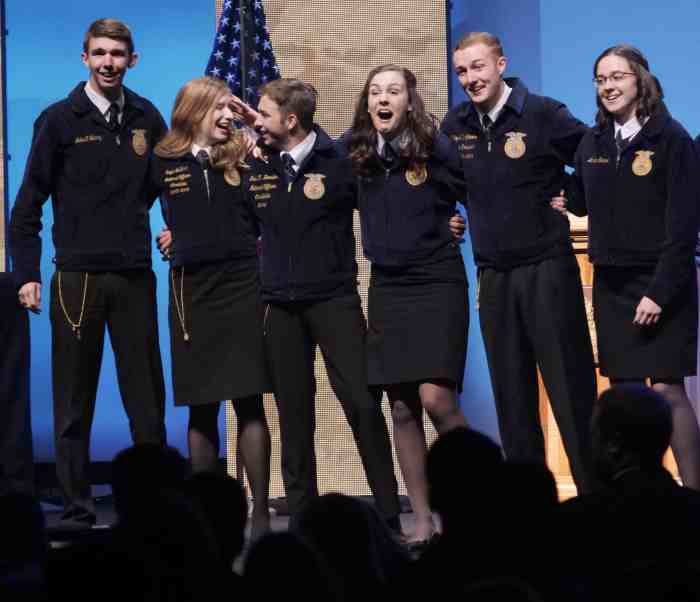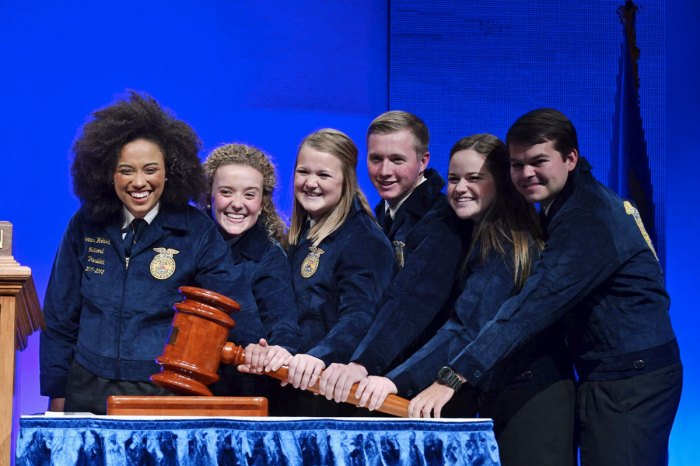Interview questions for FFA officers are meticulously crafted to assess their leadership qualities, project management abilities, and advocacy skills. These questions delve into the core responsibilities of FFA officers, ensuring they possess the necessary knowledge, skills, and commitment to excel in their roles.
From demonstrating effective communication and interpersonal skills to outlining strategies for successful FFA projects and initiatives, these questions provide a comprehensive evaluation of candidates’ potential to lead and contribute to the organization.
Leadership and Management
Effective FFA officers possess exceptional qualities and characteristics that enable them to lead and manage their chapters effectively. These include:
- Strong communication and interpersonal skills
- Integrity and trustworthiness
- Enthusiasm and passion for agriculture and FFA
- Organizational and time management abilities
- Ability to motivate and inspire others
FFA officers can demonstrate leadership and management skills through various initiatives, such as:
- Leading chapter meetings and events
- Developing and implementing FFA projects
- Representing FFA at community events
- Mentoring younger FFA members
- Serving on committees and task forces
Effective communication and interpersonal skills are crucial for FFA officers. They must be able to communicate clearly and effectively with members, advisors, and the community. They must also be able to build relationships and work collaboratively with others.
Project Planning and Implementation

Successful FFA projects are well-planned and executed. FFA officers should consider the following steps when planning and implementing a project:
- Identify a need or opportunity
- Develop a project plan
- Secure funding and resources
- Implement the project
- Evaluate the project’s success
Here are some ideas for successful FFA projects:
- Community service projects
- Educational programs
- Fundraising events
- Leadership development programs
- Agricultural research projects
FFA officers should use clear and concise language when describing their projects. They should also be able to articulate the project’s goals, objectives, and expected outcomes.
Advocacy and Outreach: Interview Questions For Ffa Officers

FFA officers play a vital role in advocating for agricultural education and FFA. They can do this by:
- Speaking to community groups and organizations
- Writing letters to elected officials
- Participating in media interviews
- Organizing advocacy events
- Serving on agricultural advisory boards
FFA officers must be able to effectively communicate the value of FFA to the community. They should be able to articulate the organization’s mission and goals, and explain how FFA benefits its members and the community as a whole.
Team Building and Collaboration
Teamwork and collaboration are essential for FFA officers. They must be able to work effectively with each other, as well as with advisors, members, and other stakeholders.
Effective team-building activities for FFA officers include:
- Communication exercises
- Problem-solving exercises
- Team-building games
- Service projects
- Retreats
FFA officers should foster a positive and inclusive team environment. They should be respectful of each other’s opinions and ideas, and they should work together to achieve the team’s goals.
Financial Management and Budgeting
FFA officers are responsible for managing the organization’s finances. This includes:
- Creating and managing a budget
- Tracking expenses
- Raising funds
- Preparing financial reports
FFA officers should be able to create and manage a budget that meets the needs of the chapter. They should also be able to track expenses and raise funds to support chapter activities.
Event Planning and Coordination
FFA officers are often responsible for planning and coordinating events. This includes:
- Identifying a need or opportunity
- Developing an event plan
- Securing funding and resources
- Promoting the event
- Coordinating the event
- Evaluating the event’s success
FFA officers should be able to plan and coordinate events that are engaging and impactful. They should also be able to promote events effectively and evaluate their success.
Personal and Professional Development

Personal and professional development is essential for FFA officers. They should take advantage of opportunities to develop their skills and knowledge.
Opportunities for FFA officers to develop their skills and knowledge include:
- Attending leadership conferences
- Participating in workshops and training programs
- Reading books and articles
- Mentoring younger FFA members
- Serving on committees and task forces
FFA officers should set personal and professional development goals. They should also seek feedback from advisors and mentors to help them achieve their goals.
Popular Questions
What are some common interview questions for FFA officers?
Common interview questions for FFA officers include those related to their leadership experience, project management skills, communication abilities, and commitment to agricultural education.
How can I prepare for an interview for an FFA officer position?
To prepare for an interview for an FFA officer position, research the organization, practice answering common interview questions, and dress professionally.
What are the qualities of an effective FFA officer?
Effective FFA officers possess strong leadership skills, excellent communication abilities, a commitment to agricultural education, and a passion for serving their community.